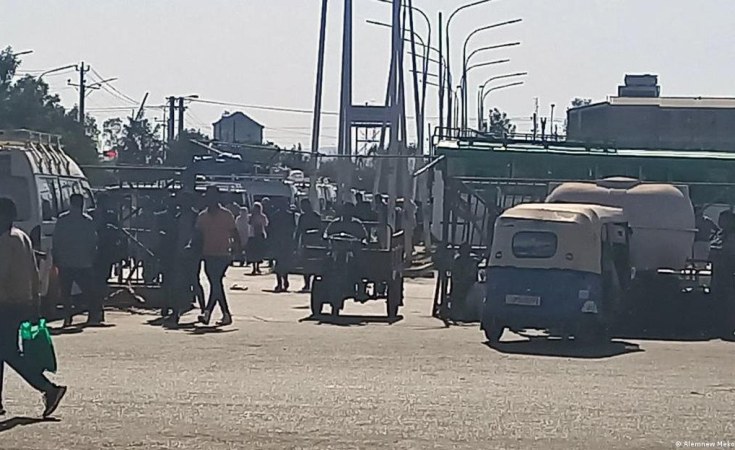Days of protests across Amhara turned violent, triggering a curfew to foil a potential security crisis. A relative state of calm has been observed in the last 24 hours - but will it last?
Federal government plans to integrate local defense forces into the police and national army has led to days of violent protests across Ethiopia's northern Amhara region. There were reports of several people being shot at during protests held on Tuesday, which marked the sixth consecutive day of rallies against the government plans.
A resident of Dessie town, one of the areas that witnessed some of the most violent clashes, told DW that Tuesday's unrest had largely receded:
"There was occasional shooting in the morning but I think it was to disperse them [the protesters]. Now the shooting has stopped but roads are still closed," the resident said.
Meanwhile similar developments were observed in Bahir Dar, the capital city of the Amhara region. Independent Ethiopian analyst Alemnew Mekonnen told DW that the anger observed on Tuesday had subsided, while some major roads remained blocked:
"Now things are calming down. Yesterday, there was a big demonstration in different areas. There was a mess yesterday but now, from all sides, things are calming down," Mekonnen said.
Stability after days of chaos
He says that life is gradually returning to normal for residents after a week of instability. "Some workers are back in their offices. Transport services have been started. Things now are in a normal track," he said.
Curfews had been imposed on three major cities of Gondar, Dessie and Debre Birhan to prevent the protests from spiraling out of control. This was reportedly accompanied by an Internet blackout, which the Ethiopian government has resorted to before to quell dissent.
Eshetu Getnet, an eyewitness to the days of violence between Amhara and Oromo militants in the neighboring areas of Ataye and Jile, told DW that the federal defense forces were instrumental in stabilizing the situation.
"It is commendable that the defense is now working fairly," Getnet said.
In a vulnerable position
The Ethiopian federal authorities say that dissolving the Amhara Special Forces (ASF) and other militia groups in Ethiopia's 11 regions and integrating them into the federal army or police will create a strong and unified force in a country, where divisions have resulted in hundreds of thousands of deaths in the past 50 years.
But the protesters in Amhara say that the government's plans would leave their state vulnerable to attack from other regions. This comes after the ASF also played a crucial role in the government's war against Tigrayan rebels - a conflict that killed thousands and displaced many more.
The dismantling and integration into the national army of the ASF is part of the peace deal with Tigray, the stipulations of which are currently being implemented by the federal government.
Mekonnen told DW that the violent protests of recent days were largely triggered by a lack of engagement with the regional forces and militia on the government's part, as the details of the peace plan were being hashed out: "As far as I know, there was no discussion between the people and the special forces," he said.
Blen Mamo Diriba, an Ethiopian researcher at the Birkbeck College at the University of London, said that despite this, the recent escalation of tensions was "unnecessary."
"Caution is of high demand to prevent another bloody civil war," she cautioned on Twitter, underscoring how fragile peace in the region is.
Some other analysts like Mekonnen have also called for more engagement between the federal government and regional leaders to resolve the situation in Amhara.
"The authorities should discuss with the people, with the special forces, with other stakeholders, so there can be some understanding," Mekonnen told DW.
Opting for mediation
One of the leaders of the Fano militia which fought alongside the federal forces against Tigrayan fighters in the recent war said that the way forward was through mediation.
"We have a ceasefire. It is settled. We will negotiate," the militia leader, who wanted to remain anonymous, told DW.
"Elders and church fathers are also engaged [in resolving the crisis]," he added, highlighting the importance of including local religious leaders in these talks.
Diriba however said that community leaders from the region should primarily focus on convincing the public to refrain from impulsive and violent acts, stressing that resolving the current crisis in Amhara was key to ending the precarious overall security situation in Ethiopia.
"Ethiopia must break this vicious cycle of violence. And the government ought to deliver on its duty in a legitimate manner without initiating hostile encounters with notable consequences on the nation's political stability and national security."


